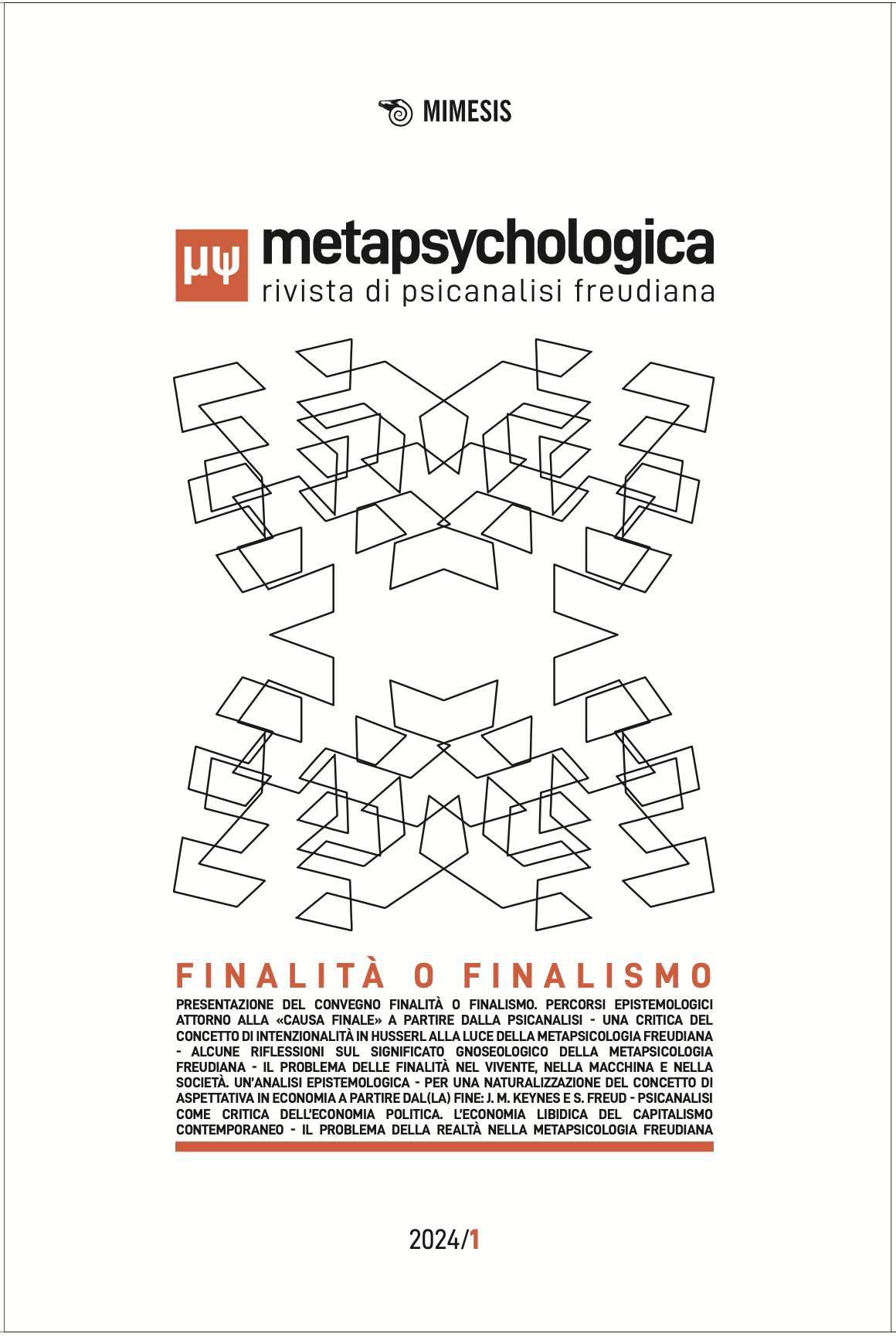Current Issue
Editorial – Metapsychologica – Journal of Freudian Psychoanalysis, vol. 2024/1
This issue of Metapsychologica collects the proceedings of the conference "Finality or Finalism: Epistemological Paths Around the ‘Final Cause’ Starting from Psychoanalysis", held in Milan on October 18–19, 2023. A conference that, already in its title, signals a theoretical urgency: that of returning to interrogate the concept of the final cause within the current context of scientific and psychoanalytic reflection.
It is from a meditation on Aristotle’s theory of the four causes that Edoardo Toffoletto opens the volume, pointing to a paradox: that the final cause, far from being a mere philosophical «add-on», coincides with nature itself. The volume does not restrict itself to historical exegesis, but engages with a more radical challenge: that of understanding whether—and how—it is still possible today to think finality—in psychoanalysis, biology, cosmology, and economics—without falling into either naïve finalism or mechanistic reductionism.
The volume consists of six contributions that explore the theme with both rigour and breadth.
Silvana Dalto offers a critique of Husserl’s concept of intentionality, comparing it with the Freudian drive model. For Husserl, intentionality as finality consists in an original and indissoluble link between subject and world; whereas a comparison with the Freudian notion of drive highlights the cognitive, epistemological, and ethical implications of the fact that the drive, in its origin, is objectless. From this, it follows that the idea of the transcendental subject at the basis of Husserlian phenomenology—reduced to a bundle of perceptual mechanisms without true inner impulses—is entirely inadequate.
Franco Baldini, in the first of two contributions included in the journal, identifies in Freud’s concept of drive a true anatomy of finality as it manifests in vital activity; Baldini naturalizes the concept of purpose, recovering aspects of the ancient Aristotelian final cause in light of contemporary scientific perspectives. His second contribution is an examination of the concept of external reality; Baldini conducts an in-depth critique of Lacan’s main theoretical errors regarding the concepts of external reality, the Real, psychic reality, representation, and more, emphasizing their inconclusive idealism. He further highlights many significant implications of Freudian theory, including a substantial integration of the theory of representation, as well as a revision of the semiotic triangle, reworked in line with Freudian insights. These and other points shed light on the modernity, foresight, and clinical depth of Freud’s theoretical positions—for all those who still dismiss Freud as an outdated thinker.
Pierpaolo Cesaroni and Marco Ferrari, in a contribution with a strong epistemological orientation, analyse cybernetics’ attempt to recover teleology in scientific terms. However, they show how this attempt runs aground on an epistemological impasse: finality is reintroduced, but only at the cost of being sterilized. The living, the machine, and society emerge as distinct yet interconnected domains in which finality resists formalization.
Maria Vittoria Ceschi offers an original reflection on economics, juxtaposing Keynes and Freud. Economic expectation, traditionally conceived in terms of strategic rationality, is here rethought through the notions of convention and animal spirits, which find an unexpected resonance in the Freudian concept of drive. This contribution opens a theoretical space for a non-reductionist naturalization of the economics of expectations.
Edoardo Toffoletto concludes the volume with an essay that explicitly attempts to ground a Freudo-Marxist critique of political economy. Libidinal economy is explored both on the subjective and collective levels, in an analysis that questions the normative paradigm of contemporary psychiatry (with particular reference to the DSM-5), and reasserts the Freudian concept of sublimation as an interpretative key for contemporary capitalism.
Taken together, these contributions offer a polyphonic reflection on a theme that touches the very heart of thought: the possibility of thinking telos—the end, the goal—without succumbing to either the idea of a preordained design or blind determinism. Psychoanalysis, in its theoretical rigour, once again demonstrates its capacity to interrogate the foundational categories of knowledge, in fertile dialogue with philosophy, science, and economics.
To all the authors—and to the readers who will engage with these paths of thought—we extend our sincere thanks. In a time when speed seems to triumph over depth, Metapsychologica continues to wager on complexity.
The Editor-in-Chief, Silvana Dalto
Metapsychologica – Rivista di Psicanalisi Freudiana


